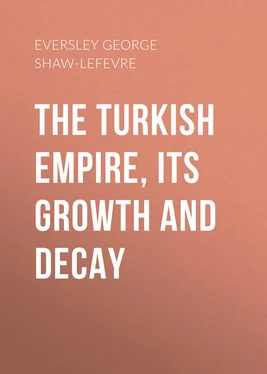George Eversley - The Turkish Empire, its Growth and Decay
Здесь есть возможность читать онлайн «George Eversley - The Turkish Empire, its Growth and Decay» — ознакомительный отрывок электронной книги совершенно бесплатно, а после прочтения отрывка купить полную версию. В некоторых случаях можно слушать аудио, скачать через торрент в формате fb2 и присутствует краткое содержание. Жанр: foreign_antique, foreign_prose, на английском языке. Описание произведения, (предисловие) а так же отзывы посетителей доступны на портале библиотеки ЛибКат.
- Название:The Turkish Empire, its Growth and Decay
- Автор:
- Жанр:
- Год:неизвестен
- ISBN:нет данных
- Рейтинг книги:3 / 5. Голосов: 1
-
Избранное:Добавить в избранное
- Отзывы:
-
Ваша оценка:
- 60
- 1
- 2
- 3
- 4
- 5
The Turkish Empire, its Growth and Decay: краткое содержание, описание и аннотация
Предлагаем к чтению аннотацию, описание, краткое содержание или предисловие (зависит от того, что написал сам автор книги «The Turkish Empire, its Growth and Decay»). Если вы не нашли необходимую информацию о книге — напишите в комментариях, мы постараемся отыскать её.
The Turkish Empire, its Growth and Decay — читать онлайн ознакомительный отрывок
Ниже представлен текст книги, разбитый по страницам. Система сохранения места последней прочитанной страницы, позволяет с удобством читать онлайн бесплатно книгу «The Turkish Empire, its Growth and Decay», без необходимости каждый раз заново искать на чём Вы остановились. Поставьте закладку, и сможете в любой момент перейти на страницу, на которой закончили чтение.
Интервал:
Закладка:
Although the capture of Constantinople was the principal feat in Mahomet’s long reign, and that on which his fame in history chiefly rests, it was, in fact, only the first of a long list of conquests which earned for him from his countrymen the title par éminence of ‘the Conqueror.’ During the thirty years of his reign he was almost always at war in personal command of his armies, and there were very few in which he did not add fresh territory to his Empire, either in Europe or Asia.
Bosnia and the Morea, which had become tributary States under previous Sultans, were now again invaded and were compelled to become integral parts of the Empire. Their princes were dethroned and put to death. Wallachia and the Crimea were forced to become vassal States. In Asia, Karamania, so long the rival and foe of the Ottomans, and which, after many wars, had agreed to pay tribute, was now forcibly annexed, and its Seljukian line of kings was put an end to by death. The great city of Trebizond and its adjoining province of Cappadocia, which had been cut off from the parent Empire, after the capture of Constantinople by the Crusaders, and formed into a miniature Empire, under the Comneni dynasty, was invaded and annexed by Mahomet, and at his instance its reigning family was put to death. The possessions of the Genoese on the coasts of the Black Sea were seized and appropriated.
Many islands in the Greek Archipelago, including Lesbos, Lemnos, and Cephalonia, were also attacked and annexed. The same fate befell Eubœa. It belonged to the Republic of Venice, which was also deprived of others of its possessions on the coast of the Morea. Besides all these enterprises, Mahomet in several successive years sent armies to ravage parts of Styria and Transylvania. He even sent an army across the frontier of Italy to ravage the region of Friuli, and other districts almost within sight of Venice, whose Republic was compelled to enter into an ignominious treaty, binding it to assist the Ottomans in other wars with a naval force. The last achievement of the ambitious Sultan was to send a force to the South of Italy, where it captured Otranto. The only captures which Mahomet attempted without success were those of Belgrade, in 1456, and the island of Rhodes in 1480. The case of Belgrade was of the greatest importance, for it long barred the way to the invasion of Hungary and Germany. The Sultan himself took command of the army of attack with a hundred and fifty thousand men and three hundred guns. He thought the capture of it would be an easy task after that of Constantinople. But Western Europe, which had rendered so little assistance to the Greek Empire in its extremities, was alarmed at the prospect of the invasion of Germany through the loss of Belgrade. The Pope preached another crusade, and a large body of knights volunteered for the defence of this frontier city.
Hunyadi led the Hungarians in this his last campaign. The lower town was taken by the Turks after great loss of life; but the upper town made a protracted resistance. The Christian knights in a notable sortie attacked the batteries of the enemy, captured all the guns, and wounded the Sultan himself. Mahomet was compelled to raise the siege after losing fifty thousand men. It was the last feat of the Hungarian patriot. He died twenty days after this signal success. It was fifty years before Belgrade was again attacked and captured and the road was opened for the invasion of Hungary and Vienna.
In all these campaigns Mahomet personally led his armies in the field, with the exception of those for the invasion of the Crimea, the attack on Rhodes, and the capture of Otranto, where he delegated the task to able generals, of whom he appears to have had an abundant supply. But there never was a great commander who more completely dominated the generals under him and maintained his supremacy in the State. He made no confidences as to his intended military operations, or what were his immediate objects of attack. There were no councils of war. His armies were collected, year after year, on one side or other of the Bosphorus, without any one knowing their destination. When, on one occasion, one of his generals asked him what was his next object, he replied that if a single hair of his beard knew what his intentions were he would pluck it out and cast it into the fire. He held secrecy and rapidity to be the first elements of success in war, and he acted on this principle. With the exception of the single case of the invasion of Wallachia, the provocation for war was in every case on the part of the Sultan. Invasion and attack were preceded by laconic messages calling upon the State or city aimed at to surrender, and the actual attack was made with the shortest possible delay.
Having determined on war and invasion, his object was pursued with the utmost vigour, and wholly regardless of the loss of life. As a rule, his campaigns were short; but the war with Venice was an exception. It lasted for many years. It consisted mainly of attacks on strongholds of the Republic in the islands of the Archipelago and the coasts of Greece and Albania, where the fleets of the two Powers played a large part. The conquest of Albania also was only effected after a struggle spread over many years, in which the patriot hero, Scanderbeg, defeated successive attacks by Ottoman armies enormously exceeding his native levies. It was not till after the death of this great chief, in 1467, that Mahomet was able to wear down opposition in Albania by sheer force of numbers.
Early in his reign Mahomet recognized the strategic value of Constantinople. It became the keystone of his Empire. He transferred the seat of his government to it from Adrianople. He fortified the Dardanelles by the erection of two castles on either side of it near to Sestos and Abydos, each with thirty guns, which commanded the Straits. This secured his capital from attack. It prevented the entrance of a hostile fleet into the Sea of Marmora and the Black Sea. He added greatly to his navy, and made it superior to that of any other single Power in the Mediterranean. It gave him absolute supremacy in the Black Sea and the Sea of Marmora. The possessions of the Genoese in the Black Sea were at his mercy. He sent a flotilla of small vessels up the Danube to assist in the siege of Belgrade.
Throughout all his campaigns Mahomet exhibited perfidy and cruelty on a scale almost without precedent. Princes, generals, and armies, who capitulated on the promises of safety of life and respect of property, were put to death without compunction, in gross breach of faith. The inhabitants of cities were sold into slavery or transferred forcibly to Turkish dominions, in total disregard of solemn pledges.
A notable case of this kind was that of Bosnia, where the final victory was achieved by the Ottoman Grand Vizier, in command of one of the armies engaged, under the supreme command of the Sultan. The Prince of Bosnia and his army capitulated on the distinct engagement in writing that their lives would be spared. Mahomet was full of wrath at this concession. It was his deliberate policy to extinguish by death the family of any reigning prince whom he vanquished in war. He consulted on the point the Mufti, with doubtless a strong hint as to what the answer should be. The Mufti issued a fetva which declared that no treaty of this kind with an infidel was binding on the Sultan. The holy man went so far as to offer himself to act as executioner. When the Bosnian king was summoned to the presence of the Sultan, and came before him trembling, with the treaty of capitulation in his hand, the Mufti himself struck off his head in the presence of the Sultan, exclaiming that it was a good deed to put an end to an infidel. The fetva in this case formed a precedent for numerous similar cases. The whole of the royal family of Comnenus, the Emperor of Trebizond, who, without a fight, surrendered his kingdom to Mahomet, upon the promise of life and private property to himself and his family, were put to death a few weeks later in Constantinople on the most flimsy pretence.
Читать дальшеИнтервал:
Закладка:
Похожие книги на «The Turkish Empire, its Growth and Decay»
Представляем Вашему вниманию похожие книги на «The Turkish Empire, its Growth and Decay» списком для выбора. Мы отобрали схожую по названию и смыслу литературу в надежде предоставить читателям больше вариантов отыскать новые, интересные, ещё непрочитанные произведения.
Обсуждение, отзывы о книге «The Turkish Empire, its Growth and Decay» и просто собственные мнения читателей. Оставьте ваши комментарии, напишите, что Вы думаете о произведении, его смысле или главных героях. Укажите что конкретно понравилось, а что нет, и почему Вы так считаете.












